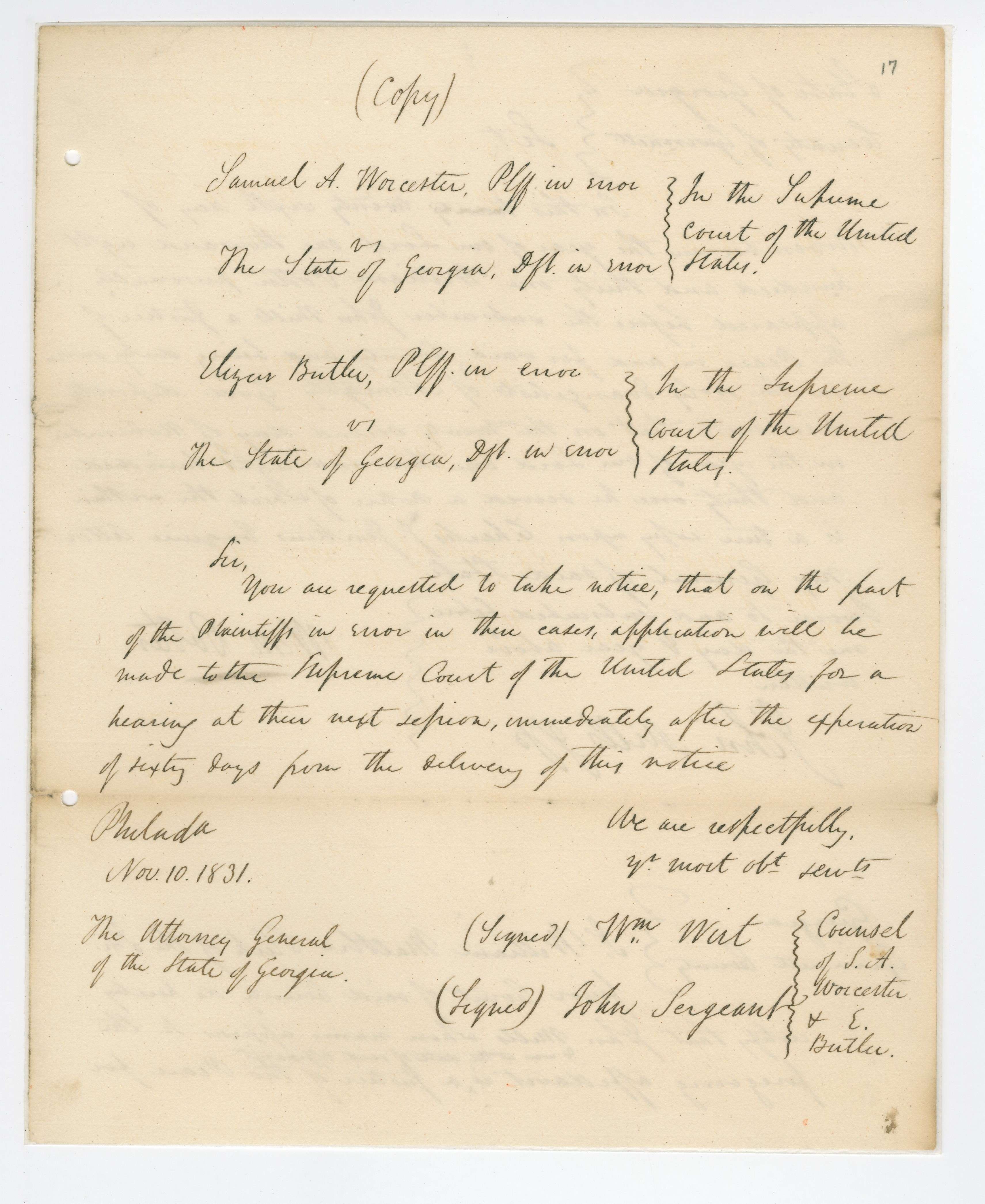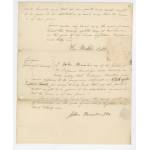Letter to the Georgia Attorney General from the Attorneys for Worcester and Butler
11/10/1831
Add to Favorites:
Add all page(s) of this document to activity:

Add only page 1 to activity:
Add only page 2 to activity:
Add only page 3 to activity:
In 1830, Georgia passed a law requiring non-Cherokee to obtain a permit from the state of Georgia to reside on Cherokee land. A group of missionaries, including Samuel Worcester and elizur Butler, were indicted by a grand jury after they went to live on Cherokee land in Georgia with permission from the Cherokee Nation and the U.S. Government. They pleaded not guilty, but the Superior Court of Gwinnet in Georgia found them guilty, and sentenced them to four years of hard labor.
The men appealed. After they were unsuccessful in the highest state court, they appealed to the U.S. Supreme Court on a writ of error (which demands the lower court provide the full record to a higher court for review of errors) in Worcester v. Georgia. The letter shown here notified the Attorney General of Georgia that Butler and Worcester's lawyers were filing a writ of error with the U.S. Supreme Court on their clients' behalf. It comes from the case file for Worcester v. Georgia.
The Federal question raised (necessary to appeal to the U.S. Supreme Court) was whether the state of Georgia had jurisdiction, since the men were present in the territory under authority of the U.S. President doing missionary work, and with the permission of the Cherokee Nation. In other words, did the state of Georgia have the authority to hear the case or to pass laws concerning sovereign Indian nations?
The question had been asked of the Supreme Court before. In 1828, Georgia had passed a series of acts taking away rights of Cherokees residing within the state, including Cherokee removal from land that the state wanted. The Cherokee asserted that Georgia did not have the jurisdiction or authority to do these things, since the Cherokee Nation was sovereign and protected under a treaty with the United States. They sought an injunction — or order to stop what the State of Georgia was doing — from the U.S. Supreme Court in Cherokee Nation v. Georgia in 1831. The Supreme Court said they lacked jurisdiction to hear the case and it was dismissed, leaving the Cherokee at the mercy of the laws of the state of Georgia.
In Worcester v. Georgia in 1832, however, the Supreme Court ruled that states, like Georgia, could not diminish rights of tribes because the Cherokee Nation constituted a nation holding distinct sovereign powers as granted by Congress and the United States. This established the principle of "tribal sovereignty." The Court also issued a mandate to release Worcester and Butler.
Georgia ignored the ruling, however, and did not release the men. President Andrew Jackson did not intervene to enforce the Supreme Court ruling. (Georgia Governor Wilson Lumpkin pardoned Butler and Worcester in 1833.)
So the judicial branch handed down a ruling that should have freed Butler and Worcester and established more sovereignty for the tribes; but it didn't have that effect because the executive branch did not enforce it.
President Andrew Jackson had called for the relocation of eastern Native American tribes to land west of the Mississippi River, and Congress had passed the Indian Removal Act, in 1830. The Cherokee were forcibly removed from Georgia — a journey west that became known as the “Trail of Tears” because of the thousands of deaths along the way.
This document was digitized by teachers in our Primarily Teaching 2016 summer workshop in Washington, D.C.
The men appealed. After they were unsuccessful in the highest state court, they appealed to the U.S. Supreme Court on a writ of error (which demands the lower court provide the full record to a higher court for review of errors) in Worcester v. Georgia. The letter shown here notified the Attorney General of Georgia that Butler and Worcester's lawyers were filing a writ of error with the U.S. Supreme Court on their clients' behalf. It comes from the case file for Worcester v. Georgia.
The Federal question raised (necessary to appeal to the U.S. Supreme Court) was whether the state of Georgia had jurisdiction, since the men were present in the territory under authority of the U.S. President doing missionary work, and with the permission of the Cherokee Nation. In other words, did the state of Georgia have the authority to hear the case or to pass laws concerning sovereign Indian nations?
The question had been asked of the Supreme Court before. In 1828, Georgia had passed a series of acts taking away rights of Cherokees residing within the state, including Cherokee removal from land that the state wanted. The Cherokee asserted that Georgia did not have the jurisdiction or authority to do these things, since the Cherokee Nation was sovereign and protected under a treaty with the United States. They sought an injunction — or order to stop what the State of Georgia was doing — from the U.S. Supreme Court in Cherokee Nation v. Georgia in 1831. The Supreme Court said they lacked jurisdiction to hear the case and it was dismissed, leaving the Cherokee at the mercy of the laws of the state of Georgia.
In Worcester v. Georgia in 1832, however, the Supreme Court ruled that states, like Georgia, could not diminish rights of tribes because the Cherokee Nation constituted a nation holding distinct sovereign powers as granted by Congress and the United States. This established the principle of "tribal sovereignty." The Court also issued a mandate to release Worcester and Butler.
Georgia ignored the ruling, however, and did not release the men. President Andrew Jackson did not intervene to enforce the Supreme Court ruling. (Georgia Governor Wilson Lumpkin pardoned Butler and Worcester in 1833.)
So the judicial branch handed down a ruling that should have freed Butler and Worcester and established more sovereignty for the tribes; but it didn't have that effect because the executive branch did not enforce it.
President Andrew Jackson had called for the relocation of eastern Native American tribes to land west of the Mississippi River, and Congress had passed the Indian Removal Act, in 1830. The Cherokee were forcibly removed from Georgia — a journey west that became known as the “Trail of Tears” because of the thousands of deaths along the way.
This document was digitized by teachers in our Primarily Teaching 2016 summer workshop in Washington, D.C.
Transcript
(Copy)Samuel A. Worcester, Plff in Error
vs
The State of Georgia, Dft in Error
In the Supreme Court of the United States
Elizur Butler, Plff in Error
vs
The State of Georgia, Dft in Error
In the Supreme Court of the United States
Sir,
You are requested to take notice, that on the part of the Plaintiffs in error in these cases, application will be made to the Supreme Court of the United States for a hearing at their next session, immediately after the expiration of sixty days from the delivery of this notice.
We are respectfully yr. most obt. servts
(Signed) Wm. Wirt
(Signed ) John Sergeant
Counsel of S.A. Worcester and E. Butler
Philada
Nov. 10, 1831
The Attorney General of the State of Georgia
State of Georgia
County of Gwinnett
On this [crossed out: twenty] twenty sixth day of November in the year of our Lord one thousand eight hundred and thirty one William Potter personally appeared before the subscriber John Mills a Justice of the Peace in and for said County and being duly sworn on the Holy Evangelists of All Mighty God deposeth and saith that on the twenty second day of November in the year of our Lord one thousand eight hundred and thirty one he served a notice of which the within is a true copy upon Charles J. Jenkins Esquire Attorney General of said State.
Wm. Potter
Sworn to and subscribed before me the day & year above written.
John Mills JP
Georgia
Gwinnett County
I, William Maltbie Clerk of the Inferior Court of said County do hereby certify that John Mills whose name appears to the foregoing affidavit is ^ & was at the date of said affidavit a Justice of the Peace for
said County and that all due faith and credit ought to be given to his attestation as such and that the same is in due form.
Given under my hand and the seal of said Court this twenty eighth day of November in the year of our Lord eighteen hundred & thirty one.
Wm Maltbie C.H.
Georgia
Gwinnett County
I, John Brewster one of the Justices of the Inferior Court for said County do hereby certify that William Maltbie whose name appears to the foregoing certificate is Clerk of the Inferior Court for said County and that all due faith & credit ought to be given to his attestation as such and that the same is in due form.
Given under my hand & seal this twenty eighth day of November in the year of our Lord Eighteen & thirty one.
John Brewster J.H.
This primary source comes from the Records of the Supreme Court.
Full Citation: Letter to the Georgia Attorney General from the Attorneys for Worcester and Butler; 11/10/1831; Appellate Case File Number 1705; Case File for Worcester v. Georgia; Appellate Jurisdiction Case Files, 1792 - 2010; Records of the Supreme Court, Record Group 267; National Archives Building, Washington, DC. [Online Version, https://www.docsteach.org/documents/document/worcester-v-georgia-letter-to-attorney-general, April 24, 2024]Rights: Public Domain, Free of Known Copyright Restrictions. Learn more on our privacy and legal page.



